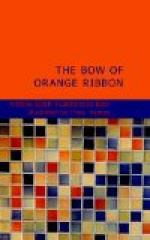With the advent of Bram and Neil, the consultation ended. The elder, grumbling at the chill and mist, wrapped himself in his plaid, and leaning on his son’s arm, cautiously picked his way home by the light of a lantern. Bram drew his chair to the hearth, and sat silently waiting for any question his father might wish to ask. But Van Heemskirk was not inclined to talk. He put aside his pipe, nodded gravely to his son, and went thoughtfully upstairs. At the closed door of his daughters’ room, he stood still a moment. There was a murmur of conversation within it, and a ripple of quickly smothered laughter. How well his soul could see the child, with her white, small hands over her mouth, and her bright hair scattered upon the white pillow!
“Ach, mijn kind, mijn kind! Mijn liefste kind!” he whispered. “God Almighty keep thee from sin and sorrow!”
[Illustration: Tail-piece]
[Illustration: Chapter heading]
II.
"To be a sweetness
more desired
than spring,—
This is the flower of life."
Joris Van Heemskirk had not thought of prayer; but, in his vague fear and apprehension, his soul beat at his lips, and its natural language had been that appeal at his daughter’s closed door. For Semple’s words had been like a hand lifting the curtain in a dark room: only a clouded and uncertain light had been thrown, but in it even familiar objects looked portentous. In these days, the tendency is to tone down and to assimilate, to deprecate every thing positive and demonstrative. But Joris lived when the great motives of humanity stood out sharp and bold, and surrounded by a religious halo.
Many of his people had begun to associate with the governing race, to sit at their banquets, and even to worship in their church; but Joris, in his heart, looked upon such “indifferents” as renegades to their God and their fatherland. He was a Dutchman, soul and body; and no English duke was prouder of his line, or his royal quarterings, than was Joris Van Heemskirk of the race of sailors and patriots from whom he had sprung.
Through his father, he clasped hands with men who had swept the narrow seas with De Ruyter, and sailed into Arctic darkness and icefields with Van Heemskirk. Farther back, among that mysterious, legendary army of patriots called “The Beggars of the Sea,” he could proudly name his fore-goers,—rough, austere men, covered with scars, who followed Willemsen to the succour of Leyden. The likeness of one of them, Adrian Van Heemskirk, was in his best bedroom,—the big, square form wrapped in a pea-jacket; a crescent in his hat, with the device, “Rather Turk than Papist;” and upon his breast one of those medals, still hoarded in the Low Countries, which bore the significant words, “In defiance of the Mass.”
He knew all the stories of these men,—how, fortified by their natural bravery, and by their Calvinistic acquiescence in the purposes of Providence, they put out to sea in any weather, braved any danger, fought their enemies wherever they found them, worked like beavers behind their dams, and yet defiantly flung open their sluice-gates, and let in the ocean, to drown out their enemies.




